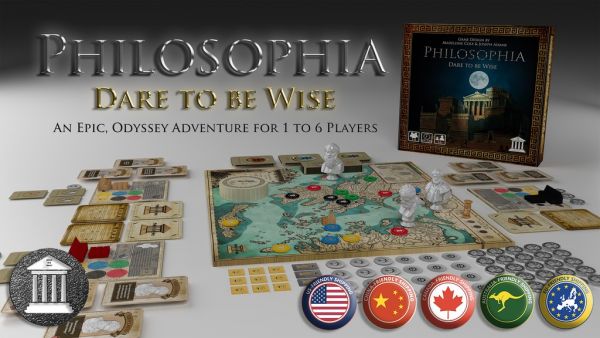Victory Points: Joseph Adams Explores Ancient Greek Teachings with Philosophia

“You have the stories and adventures, the rich mythology and of course, the Philosophy.”
The combination of a robust theme with immersive mechanics is the prime matter for board gaming enthusiasts. Getting sucked into a rich story through the actions offered via game components, be it of one’s own creation or a built-in narrative constructed by the designers and publishers, is the philosophy all gamers are chasing.
In the case of Joseph Adams (along with his design partner, Madeleine Cole), actual philosophy became the basis for the duo’s first design, Philosophia. “I have been fascinated by Ancient Greeks for a very long time,” begins Adams. “I just love the ideas — the wisdom — that existed in that era of human history.”
Adams and Cole come by their mutual interest by trade: both are high school teachers. “My specialism is Philosophy and Madeleine’s is Psychology and Sport. We are both avid board gamers and have designed several games for ourselves, however [Philosophia] felt special,” explain Adams.
“How do we fit in everything we wanted to?”
Philosophia is a study of Ancient Greece, blending historically accurate philosophers, ideas, and locations with a little of the fantastical to keep gameplay engaging. “Given the rich world we were using we wanted the game to have the Sandbox autonomy of games like Xia and Western Legends,” Adams describes. “A big influence was Innis. We love the game endings in Inis and wanted to create something with that same connection to narrative. Inis also was part of the inspiration behind the card drafting mechanic for our Oracle cards.”
Adams continues, “[W]e decided on making multiple paths to victory and requiring players to gain any three of these paths. We then balanced the game so that in most cases more than one player would reach this end. The game is then decided by a final debate using a twist on the rock, paper, scissors, lizard, Spock mechanic, not dissimilar to the new Combo Fighter game. In short, there were lots of inspirations from other games.”
“However, it’s not too intimidating.”
Despite the many Euro influences and a lofty theme, Adam promises the game is accessible. “We’ve played it a lot with people who are new to analog gaming and haven’t had any issues. But again, our priority always was to make the game fun first.”
Adams goes on to explain that fun “always came first. If we had to make a decision that affected gameplay we always sided with making the game fun. If it’s not fun, then what would be the point?” Of course, the educator in Madeleine and him “found that being accurate made it more fun.”
However, there are instances where historical accuracy took a backseat to fun despite the heavy reliance on ancient Greek philosophy, Adams details. “So the ideas took precedence over historical accuracy. For example, many of the logical terms on the argument cards are Latin, which obviously wasn’t spoken in ancient Greece! But they are the correct logical terms, so we decided this was more useful to players as they would learn the correct modern usage. The inclusion of the gods was also done here to focus on that feeling of Greek culture and thought which the gods were a big part of!”
“It’s been a huge amount of work but also incredibly rewarding.”
Adams notes that creating a game that was replayable, had multiple game endings, and were as true as possible to its unique theme were central to Philosophia’s design core. But he also notes that with all that he and Madeleine incorporated, there were concerns the game may offer too much. “There is just so much you can do in this world that we had to be careful not to try and force everything in and make it convoluted and less playable. As such, some great characters and ideas we had, had to be lost to keep only what was best and what worked best together.”
Yet, the duo knew that developing the game was more than just being Philosophia’s designers. To publish the game, they started Cogito Ergo Meeple. The undertaking to launch Philosophia via Kickstarter has come with its own set of growing pains, as Adams notes. “Some parts aren’t as fun, like negotiating with manufacturers or social media marketing, but what has been awesome is the response from other people in the hobby. We’ve had so much support from people around the world just getting in touch and giving encouraging messages.”
It’s the board gaming community to which Adams gives much credit for the launch and success of Philosophia. “In the build up to the campaign we had so many people willing to test the game out, then they’d give us this really useful feedback. The dedication and kindness of these people really improves our whole hobby. I know Philosophia was designed as much by feedback from play testers as it was by us!”
Philosophia is currently on Kickstarter.




